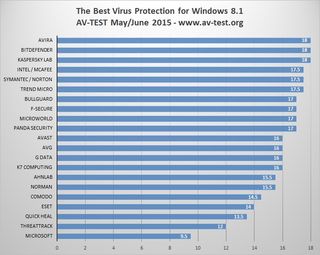Avira, Bitdefender, Kaspersky Top Antivirus Test Results
Avira, Bitdefender and Kaspersky Lab achieved perfect scores on AV-TEST's latest evaluation, while Microsoft came in dead last.


The time has come again for AV-TEST, a German firm that periodically evaluates antivirus programs, to share its results for Windows 8.1.
For longtime followers, the outcome is not shocking: Avira, Bitdefender and Kaspersky Lab achieved perfect scores, while Microsoft's built-in Windows Defender scraped the bottom of the barrel once again. The former three can be considered among the best antivirus software programs.
Evaluations conducted by the Madgeburg, Germany-based independent lab measure the effectiveness of Windows, Android and Mac antivirus software for home and corporate users.
The current crop of AV-TEST results comes from measurements taken in May and June 2015, and rates each program based on standards of protection, performance and usability. A program could earn up to six points in each category.
MORE: Best Antivirus Software and Apps
Perfect scores of 18 went to Avira Antivirus Pro 2015, Bitdefender Internet Security 2015 and Kaspersky Lab Internet Security 2015. (AV-TEST evaluates those products submitted to it by vendors; most vendors have more than one product, but each malware engine should be the same across a single vendor's Windows product line.)
Running the programs has a negligible effect on a computer's performance, and each one is very simple to navigate.
Sign up to get the BEST of Tom’s Guide direct to your inbox.
Upgrade your life with a daily dose of the biggest tech news, lifestyle hacks and our curated analysis. Be the first to know about cutting-edge gadgets and the hottest deals.
Competing products from Ahn Lab, F-Secure, G Data, McAfee, Microworld, Norton Symantec and Trend Micro also scored perfect sixes in the malware-protection category, though were less than perfect in at least one of the other two categories.
All provided complete or virtually complete protection from "widespread and prevalent" malware well known to antivirus vendors, as well as "zero-day" malware discovered within the four weeks before testing.
Many of these brands also make software for Macs and Android devices; for more on those platforms, check out our lists of the best Mac antivirus software and the best Android antivirus apps.
Fourteen out of the 21 programs tested scored either 99 or 100 percent in both categories. (At Tom's Guide, we use AV-TEST's malware-protection scores for our own reviews of antivirus software; however, we run our own performance tests and usability assessments.)
On the other end of the spectrum, Microsoft Windows Defender was in a category all its own, scoring only 9.5 out of a possible 18 points. The program earned an ignominious half-point in the protection category, blocking only 89 percent of existing threats and 95 percent of new ones. It also scored a mere 3 in performance, having consumed a lot of system resources, although it was extremely user-friendly, earning a perfect six points in usability.
Other poorly performing programs included ThreatTrack VIPRE Internet Security 2015, Quick Heal Total Security 16.0, and ESET Smart Security 8.0, which scored 12, 13.5 and 14 points, respectively, making them comparatively weak choices.
While AV-TEST does not advocate purchasing or avoiding any programs in particular, the results suggest that some programs are, indeed, safer than others. The salient point is that the built-in Microsoft software does not provide adequate protection for most users. Whatever antivirus program you choose, you probably shouldn't use Windows Defender as your first line of defense.
- Best Identity-Theft Protection
- Mobile Security Guide: Everything You Need to Know
- What to Do After a Data Breach
Marshall Honorof is a senior writer for Tom's Guide. Contact him at mhonorof@tomsguide.com. Follow him @marshallhonorof. Follow us @tomsguide, on Facebook and on Google+.
Marshall Honorof is a senior editor for Tom's Guide, overseeing the site's coverage of gaming hardware and software. He comes from a science writing background, having studied paleomammalogy, biological anthropology, and the history of science and technology. After hours, you can find him practicing taekwondo or doing deep dives on classic sci-fi.

